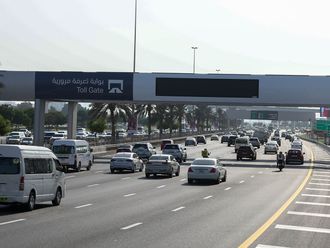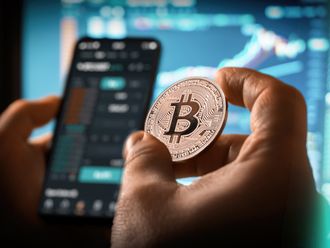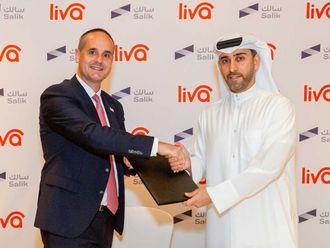
Sydney/Tokyo: Asian stocks advanced last year, capping the MSCI Asia Pacific Index's biggest two-year gain since 2004, as improving corporate earnings and US economic stimulus measures offset concern over Europe's sovereign debt crisis and China's anti-inflation measures.
BHP Billiton Ltd advanced 4.9 per cent in 2010, pacing gains among metal and energy producers on higher commodity prices. CNOOC Ltd, China's largest offshore oil company, surged 51 per cent in Hong Kong.
Canon Incorporated, a Japanese camera maker which makes about 80 per cent of its sales abroad, gained 7.7 per cent in Tokyo as the United States expanded measures to boost its economy.
Hyundai Heavy Industries Company, the world's largest shipbuilder, soared 155 per cent in Seoul after third-quarter profit jumped.
The MSCI Asia Pacific Index climbed 14.3 per cent last year to 137.70, extending 2009's 34 per cent gain, supported by central banks cutting borrowing costs and governments boosting spending to shore up their economies to tackle the global recession.
The Asia Pacific gauge sank by a record in 2008 as the credit crisis and a deepening global recession pummelled corporate profits around the world.
Investor confidence
"Investor confidence has swung back to a view that the global recovery is on track," said Shane Oliver, Sydney-based head of investment strategy at AMP Capital Ltd, which manages about $90 billion (Dh330 billion).
"Despite lingering concerns, it should continue with some solid earnings gains. Global liquidity is plentiful, while companies are cashed up, boosting the prospects for mergers and acquisitions, dividend increases and buybacks."
Hong Kong's Hang Seng Index climbed 5.3 per cent last year, extending 2009's 52 per cent increase, the steepest since 1999. South Korea's Kospi Index jumped 22 per cent, while Australia's S&P/ASX 200 Index declined 2.6 per cent.
Japan's Nikkei 225 Stock Average lost 3 per cent, as a strengthening yen dimmed the earnings prospects of some of the nation's exporters. The yen was at its strongest annual average level since currencies began trading freely in 1971, according to data compiled by Bloomberg and based on each day's closing price.
China's Shanghai Composite Index declined 14 per cent, the worst performer in Asia, as the government ordered banks to set aside more reserves six times last year and boosted rates to tame inflation and curb asset bubbles following record gains in lending and property prices.
The benchmark also posted the biggest decline among 15 of the world's largest stock markets.
Material shares lead
Material, energy and industrial stocks rose the most among the 10 industry groups tracked on the MSCI Asia Pacific Index in 2010, where stocks are valued at 14.8 times estimated earnings on average, compared with 14.7 times for the US Standard & Poor's 500 Index and 12.3 for the Europe Stoxx 600 Index.
BHP Billiton, the world's largest mining company and Australia's biggest oil producer, advanced 4.9 per cent to A$45.25.
The company was the leading mover on the MSCI Asia Pacific index last year. Rio Tinto Group, the world's No 3 mining company, advanced 14 per cent to A$85.47. CNOOC surged 51 per cent to HK$18.44 in Hong Kong, while Korea Zinc Company, which produces gold and silver, added 36 per cent in Seoul.
Crude oil advanced in New York last year to the highest year-end level since 2007, while copper rose 33 per cent to $4.447 a pound. Gold futures rallied 30 per cent last year as Europe's debt crisis drove investors to the precious metal as a haven.
The MSCI Asia Pacific Index's gains in 2010 take its two-year advance to 54 per cent, the steepest since the period ended December 2004, when the region emerged from a retreat triggered by the bursting of the dot-com bubble in 2000. Gains in 2009 — following 2008's record 43 per cent drop — were spurred by a record lending and government stimulus measures in China, which helped pull the world economy out of recession.
"After markets bottom, they tend to have a quick recovery in the first year, before petering out and then stepping up again in the following years," said James Holt, who helps manage about A$40 billion at BlackRock Investment Management (Australia) Ltd.
The MSCI Asia Pacific gauge rose to a 21 month-high on April 15 as economic stimulus policies bore fruit, before dropping to an almost one-year low on May 25 amid concern slowing US economic growth and China's anti-inflation measures might choke off the recovery.
Europe, Fed stimulus
The MSCI Asia Pacific Index since rose 26.5 per cent, to end the year at a two-and-a-half-year high, as financial rescue plans for Greece and Ireland calmed concern that Eur-ope's sovereign debt crisis may spread to more countries, and after the US Federal Reserve said on November 3 that it will buy an additional $600 billion of Treasuries to bolster growth in the world's largest economy.
The Fed's measures helped boost the shares of Asian exporters, with the MSCI Asia Pacific Consumer Discretionary Index rising 15 per cent last year.
Li & Fung Ltd, the biggest supplier to retailers including Wal-Mart Stores, jumped 40 per cent to HK$45.10. Cathay Pacific Airways Ltd, Hong Kong's biggest carrier, gained 48 per cent to HK$21.45 as the global travel landscape brightened. Samsung Electronics, Asia's biggest maker of chips, flat screens and mobile phones, gained 19 per cent to 949,000 won in Seoul. In Tokyo, Canon advanced 7.7 per cent to 4,210 yen.
Analysts estimate earnings per share on the MSCI Asia Pacific index are set to rise 11 per cent in the next 12 months, according to data compiled by Bloomberg.
Hyundai Heavy surged 155 per cent to 443,000 won in Seoul, as the company said on October 28 that net income climbed to 863.4 billion won ($770 million) from 533.8 billion won a year earlier, beating the 716.9 billion won average of 22 analyst estimates compiled by Bloomberg. SJM Holdings Ltd, the casino operator controlled by Macau billionaire Stanley Ho, soared 188 per cent to HK$12.34 in Hong Kong after saying in August that its first-half profit rose more than fourfold after it added more tables for high rollers from China. SJM posted the fourth-biggest increase on the MSCI Asia Pacific index for the year.
Income jumped
PT Charoen Pokphand Indonesia, Indonesia's biggest producer of chicken feed, posted the biggest gain on the MSCI Asia Pacific index last year, surging 309 per cent to close at 1,840 rupiah on December 30, the final day of trade for the year in Jakarta. The company said in October that nine-month net income jumped 50 per cent to 1.6 trillion rupiah.
Brilliance China Automotive Holdings Ltd, which makes vehicles with BMW and Toyota, showed the fifth-biggest advance on the Asian index last year, jumping 171 per cent to HK$5.93. The company said it returned to a profit in the first half of 2010 as economic growth spurred demand for luxury sedans in China, the world's biggest auto market.












